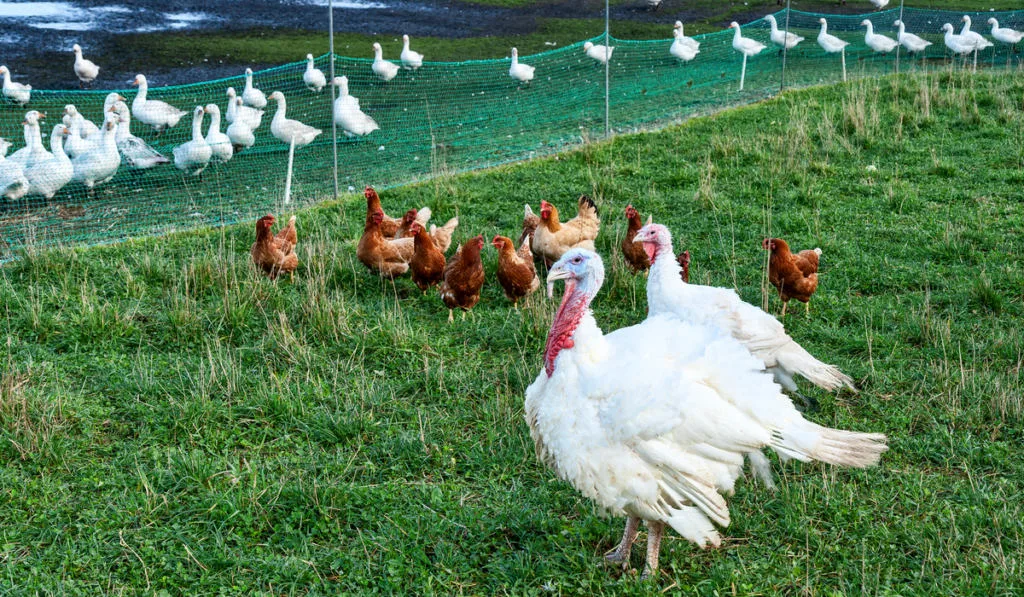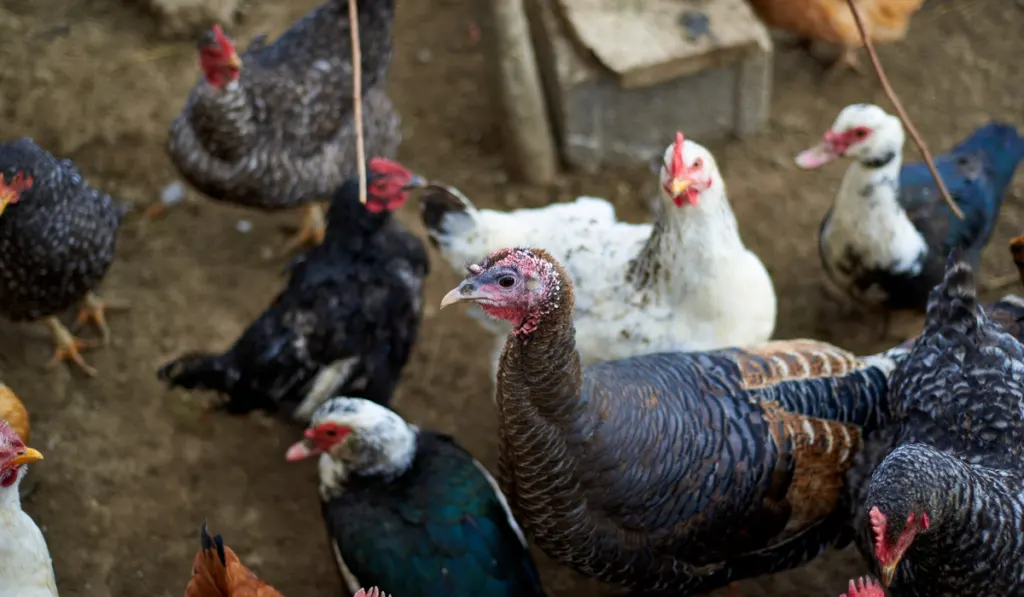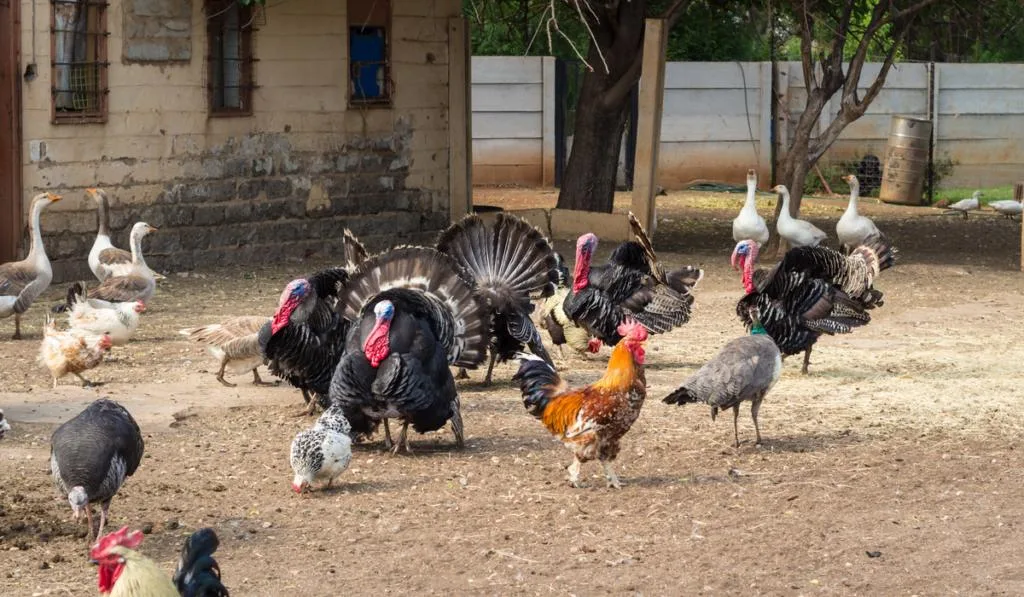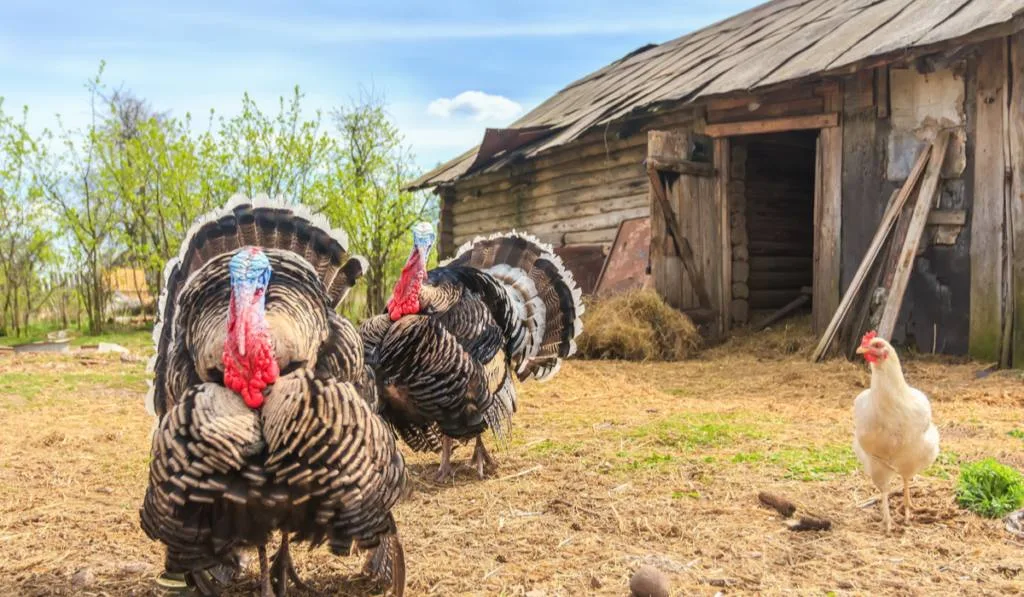Humans are constantly pushing the limits and experimenting with new things. It comes as no surprise that people who own both chickens and turkeys wonder if these two species can mate with each other.
We know that they live in harmony together, but can turkeys mate with chickens?
Even though they are both types of poultry, they are different species.
Turkeys can mate with chickens, but they shouldn’t because most hybrids won’t even hatch successfully. When they attempt it, the chickens are often injured because they are much smaller than the turkeys.

So, although it is physically possible for these two species to mate, it is advised that you instead try to prevent it from happening altogether.
This article will discuss why these two species of birds should not interbreed and what you can do to prevent it from happening.
Table of Contents
What Happens When A Turkey Mates With A Chicken?
When male turkeys inseminate chicken embryos, both female and male embryos are formed. Sadly, the males often die during the stages of their development because they are less viable than the females.
No hybrids hatch, but the unfertilized eggs start to divide.
In 1960, MW Olsen from the Department Of Agriculture was able to breed turkey and chicken hybrids successfully; however, the chicken-turkey cross-breeding only seemed to produce males.
Olsen also concluded that when Beltsville Small White turkey hens were artificially inseminated using the seamen of Dark Cornish male chickens, the hybrids that hatched were the white color of the turkey but had the dominating black plumage of the chicken.
Serological studies proved that they were, in fact, hybrids. Although turkey sperm cannot fertilize a chicken egg, it can trigger cell division in an unfertilized egg.
Unusual chicks have appeared, but these studies are anecdotal and not supported by DNA conducted studies.
It is believed that these strange chicks are a result of recessive genes in the parents or from cross-breeding with pheasants or guinea fowl.

Why Turkeys Should Not Mate With Chickens
Turkeys and chickens are classified as two different species, and they should not be cross-bred.
However, this will not stop a male turkey from trying to mate with hens of the other species, and they are reported to attempt it often.
There are too many factors that prove that you should separate these two species if you witness them in the act. They are just not compatible, from physical size to genetic composition.
The following reasons explain why Chickens and Turkmens do not exist;
Different Chromosomes
Chickens
Chickens have 78 chromosomes (2n=78). These chromosomes are broken down into one pair of sex chromosomes, 32 microchromosomes (or intermediate chromosomes), and six pairs of macrochromosomes.
The International Chicken Genome Sequencing Consortium includes five pairs of macrochromosomes, five pairs of intermediate chromosomes, and 28 pairs of microchromosomes.
Turkeys
Turkeys have 80 chromosomes (2n=80). According to Wikipedia, “The Karyotype contains an additional chromosomal pair relative to the chicken due to the presence of at least two fission/fusion differences.”
Size
The difference in size between these two birds is spectacular. A turkey is almost twice the size of an average sized hen, and if the male turkey attempts to mate with a chicken, he will trample on and injure her badly.
In some instances, the hens succumb to their injuries. The turkeys are so heavy that they crush and suffocate the poor hens, and to make matters worse, the breeding is not even successful.

Chickens
An average-sized hen weighs between 4-10lbs, and they stand at 27 inches tall.
For further information about how much do chickens weigh for each breed, you may check this article.
Turkeys
A wild turkey is one of the biggest birds in North America. A male can grow up to 4 feet long (beak to tail). Male turkeys weigh an average of 18lbs, with the largest recorded turkey weighing an incredible 37lbs!
How To Prevent Turkeys From Mating With Chickens
It would be best to keep turkeys and chickens in separate coops because chickens carry a disease called Blackhead. This disease spreads to the turkeys and makes them very sick.
Their temperaments are also different, and more often than not, the chickens get hurt by the turkeys if they’re raised together.
One benefit of keeping these birds in the same area is that the turkeys can pass on some resistance to Marek’s disease to the chickens. The turkey Marek’s virus is the virus used to create chicken Marek’s disease vaccines.
Separate Coops
Keeping turkeys and chickens in separate enclosures does not mean you have to keep them from mingling at all. But since it is impossible for a person to keep an eye on them 24/7, having separate coops or enclosures for times that you cannot be there is a good idea.
Although they can live harmoniously side by side, mating should be prevented by all means necessary.
Chickens and turkeys also have different dietary needs. Turkeys eat food with a much higher protein content than chickens, so keeping them in their own spaces will keep the birds from eating each other’s food.

Have Enough Female Turkeys For The Males
If you have enough space to keep more birds, try to find the perfect balance ratio of female to male turkeys. If the males have enough females of their kind, they are less likely to try and mate with chicken hens.
This is also something that needs to be monitored. You will have to observe them closely to see if you need to increase your flock or not.
Protect The Chicken Hens
Should the problem get out of hand, separate the chicken hens from the rest of the flock. And if it is mating time, place only the male chickens with the hens instead of allowing them to be around the male turkeys.
You can have chicken mesh as a dividing fence so that they can still see all the other birds, but they will be protected from the turkeys at the same time.
You will have to experiment to get the balance right and to find a harmonious environment for all the birds to live in.
In Conclusion
Now we know that even though turkeys and chickens can live together and get along, nature will still take its course, and reproduction will prevail all other needs and wants at the time it is happening.
It is the way of life, and although we cannot control life, we can protect those who cannot defend themselves.
Hens don’t know any better. Turkeys don’t know any better. They are simply doing as nature intended.
So, if you want to avoid any of your chicken hens getting injured or dying, then always follow the old saying, “Prevention is better than cure.”
There is no reason you can’t have a peaceful flock of mixed-species living amongst one another because you can manage the level of peace. Some things in life just don’t mix. One of those things is Turkeys trying to mate with chickens.
Resources
- https://www.backyardchickens.com/threads/turkey-mating-my-hen.842215/
- http://messybeast.com/genetics/hybrid-birds.htm
- https://chickenandchicksinfo.com/can-turkeys-live-with-chickens/
- https://www.theselfsufficienthomeacre.com/2015/02/keeping-a-mixed-flock-can-you-keep-chickens-turkeys-together.html
- https://www.backyardchickens.com/threads/turkeys-mating-with-chickens.1123452/
